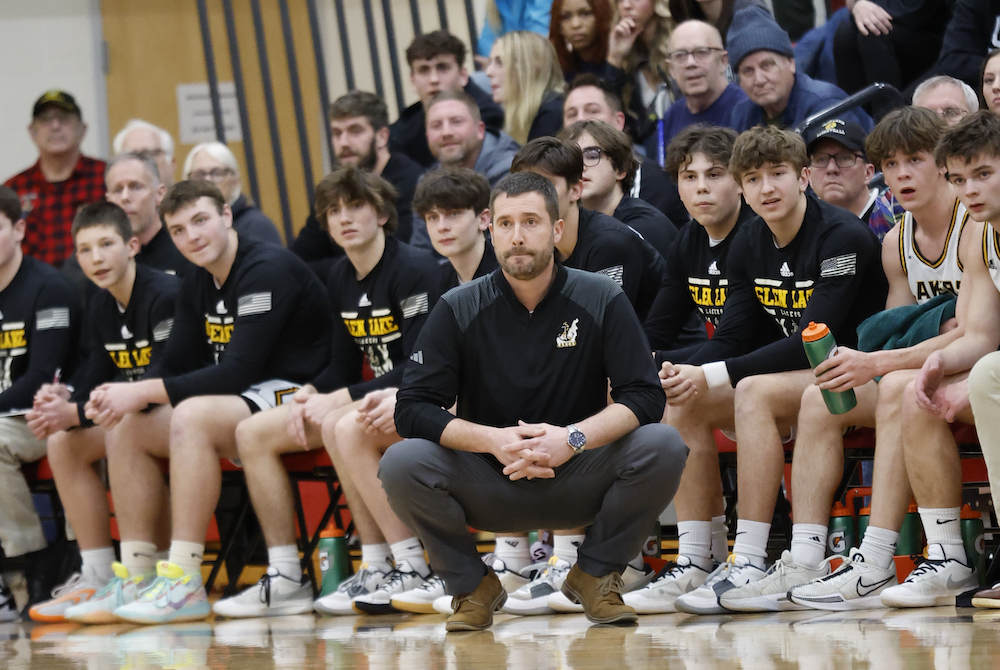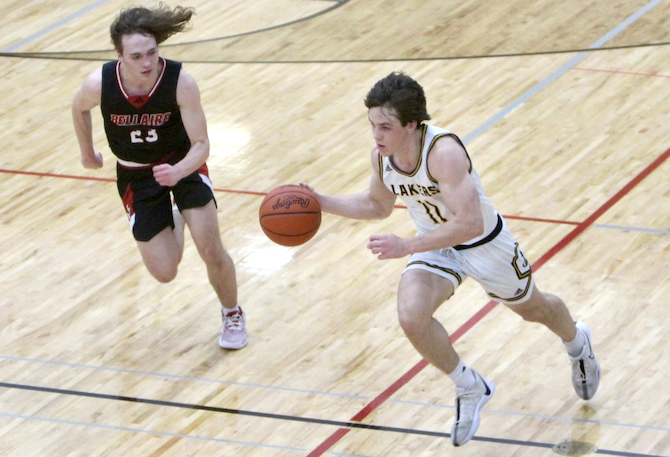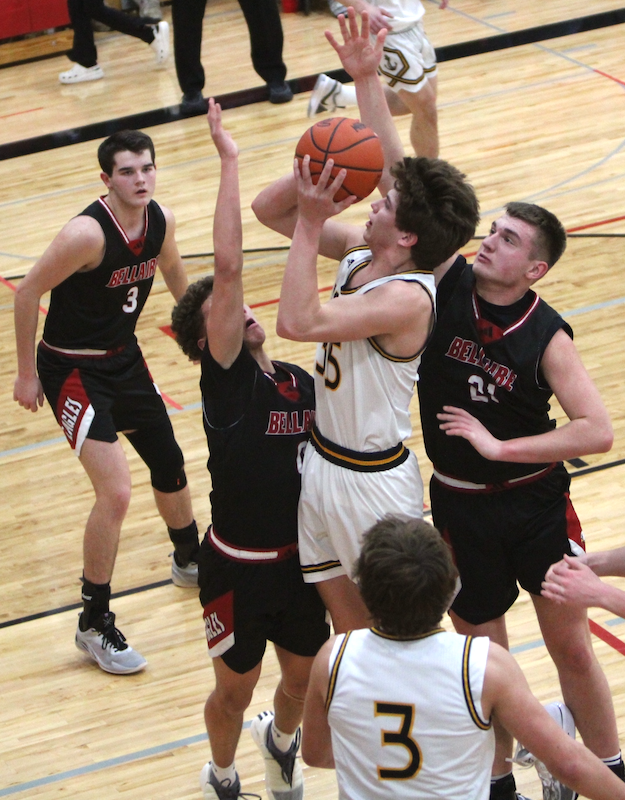
Erik O, Legend on the Microphone
By
Geoff Kimmerly
MHSAA.com senior editor
March 21, 2013
One of Erik O. Furseth’s favorite moments every March – perhaps the one he looks forward to most – comes during the hour before each MHSAA Basketball Semifinal.
From his familiar seat on press row, Furseth has called hundreds of Michigan State University and MHSAA Finals basketball games.
But the opportunity for high school teams to play at Breslin Center is not lost on him, especially as he watches players and fans enter the arena for the first time.
“(It’s) the kind of awe that overtakes people when they come there,” Furseth explained earlier this month. “The enthusiasm reflected on the kids there and so on.
“What a thrill for those kids to come and play a ballgame there.”
Now imagine Furseth saying this with the voice that’s become legendary to generations of basketball fans across this state.
Furseth, 82, has been a member of the MSU basketball family for more than 60 years. A player first, he since served as the homecourt voice of MSU basketball from 1968-02 and MSU football from 1971-98, and this weekend is continuing a run of calling MHSAA Boys Basketball Finals that began more than four decades ago while those games still were played at Jenison Field House.
Some of his phrases are on ready recall for those who have sat in his audience.
“The clock is correct and official.”
“Yesssss … on the basket!”
“Heeeee gets the bonus.”
Last weekend, Furseth also called his sixth MHSAA Girls Basketball Finals, and he’s announced MHSAA football championship games since their days at the Pontiac Silverdome and Baseball Finals for a decade. Furseth also just finished his third season as voice of Traverse City St. Francis football and girls and boys basketball.
“Erik is able to make that job not just a game, but an event,” St. Francis athletic director Tom Hardy said. “To have somebody of his caliber, with his recognition, in a small gym in Traverse City … whether there are 100 people or it's standing room only, it’s so great to know the professionalism of that is taken care of. He just understands kids.”
Furseth moved from East Lansing to Traverse City 18 years ago. That he would find his way to the microphone in his new hometown makes sense. But that it became the tool of his trade the last half-century certainly would be considered a detour from his original plan when Furseth turned down a chance to play football for Woody Hayes so he could study forestry in East Lansing.
Life-changing moments
“Erik O. on the radio” was the voice of Lansing rock-n-roll radio during the 1950s and 60s.
“He was the number one disc jockey in this area before they were called disc jockeys,” said Lansing WILX sports director Tim Staudt, who grew up in East Lansing and has worked in mid-Michigan television for four decades and as a daily radio host for 20 years.
“He has the all-time greatest voice, and obviously it's held up to this day.”
Furseth grew up in Cleveland Heights, Ohio, and got to know Hayes while the soon-to-be-legendary coach was finishing his tenure at Denison University. Hayes hoped Furseth, a high school football standout, would become part of the coach’s first recruiting class after taking the job at Miami (Ohio) before the 1949 season.
But Furseth, who had vacationed in Michigan growing up, was drawn to MSU’s forestry program. So he made a trip to campus – picked up by then-assistant Duffy Daugherty for a visit with head coach Biggie Munn – and was sold on coming to East Lansing instead.
It didn’t take long for his future to turn in an unplanned direction.
Furseth was injured his first fall with the Spartans, and he never played a down of college football. But at that time, MSU sent all freshmen who had played high school basketball a card encouraging them to try out for the Spartans’ freshman hoops team. Furseth, also a 6-foot-3 post player in high school, not only made that MSU team but played three seasons on the varsity under another future coaching legend – Pete Newell, who would go on to lead teams to NCAA and Olympic championships. Furseth played in MSU’s first Big Ten game, against Northwestern in 1951.
 It was during sophomore year that Furseth’s academic future also changed lanes. Forestry students were required to take a soil science class offered only during the winter and from 3-5 p.m. – a conflict with Furseth’s basketball commitments. He dropped the class, dropped the major, and as a junior switched course of study to communications.
It was during sophomore year that Furseth’s academic future also changed lanes. Forestry students were required to take a soil science class offered only during the winter and from 3-5 p.m. – a conflict with Furseth’s basketball commitments. He dropped the class, dropped the major, and as a junior switched course of study to communications.
MSU basketball’s announcer at that time, Larry Friedmeyer, was among a few who took note of Furseth’s deep and authoritative tone, and suggested he audition for the campus’ WKAR radio station. Furseth was hired at 75 cents an hour to host a few nights each week of “The Concert Call,” a classical music program, and later that year joined local station WILS to read the evening news. After serving in the Air Force, Furseth returned to WILS – and a star was born.
Furseth was a DJ for WILS for 14 years. On Saturdays for a decade, he hosted dances at the Lansing Civic Center that drew 1,000 teenagers a night – and one evening, included a surprise drum performance by a famous student at the local Michigan School for the Blind, known then as Little Stevie Wonder.
Furseth later managed WILS from 1956-68. “Being the manager made it no fun anymore,” Furseth noted.
He left for a job outside of radio. But the fun returned when his announcing career began.
Erik O on the microphone
The “O,” by the way, stands for Olaf. Furseth’s parents are from Norway. “Erik O” was a smooth radio name early in his career when he was filling in for mentor Dave Froh – “Erik O for Dave Froh” – so it stuck.
In his role at a basketball game, Erik O admittedly doesn’t see much of it – at least, as a fan might. He can say his top three MSU players during his time as announcer were Scott Skiles, Magic Johnson and Johnny Green. But for the most part, Furseth focuses on the factual information he must supply with every substitution, foul and break.
He found that winning formula long ago.
“He’s just a nice guy – and nice guys don’t usually last on the air as long,” said Lansing sports radio personality Earle Robinson, who recently retired after 39 years at WKAR. “He’s always had good relationships and such a pleasant personality.”
“You’d never know he was a basketball player or anything. He’s very free of any ego, very helpful to people and generous of his time,” said longtime MSU men’s basketball broadcaster Gus Ganakas, who formerly coached the Spartans from 1969-76 and was an assistant on Furseth’s freshman team.
“And particularly in basketball, he knew what he was doing. He’s a former player and has a background as an athlete, and he has a pleasing voice. I’ve always admired him because of his devotion to what he’s doing.”
High school sports are high on that list.
Furseth enjoys announcing the seventh and eighth grade football teams that play at Traverse City’s Thurlby Field – “They think they’re big time,” he said – and finds it incredible how much the high school teams can improve over the course of a season.
He relishes the camaraderie he sees at Class C St. Francis, and wishes he’d attended a similarly-small school himself. To a player who was wearing his former number, he said, “You’re wearing my number. Do it right.” And the St. Francis boys basketball team felt at home at Breslin Center in 2012, when it finished runner-up to Flint Beecher while a familiar voice called the action.
Furseth recalled earlier this month. “Really, for me, high school (sports) exemplifies the development of our kids athletically and in many other ways. You learn a lot of things in athletics.”
“When I think about my life, to think something I started led to doing this; I’m thrilled that it happened,” Furseth said of returning to another Finals. “It’s always been a great thrill for me to do it.”
PHOTOS: (Top) Erik O. Furseth calls the Saginaw/Rockford Class A Boys Basketball Final last season at Breslin Center. (Middle) Furseth prepares to call another game during the 1999 Boys Finals weekend at Breslin.

After Leading Glen Lake Girls to Title, Bradford Brings Boys Into Final Week
By
Tom Spencer
Special for MHSAA.com
March 15, 2024
Eight is Enough.
 Or is it?
Or is it?
For Jason Bradford growing up on the farm of Arden and Lynn Bradford as one of their eight children, it probably was enough. Bradford’s upbringing may have been slightly similar to “Eight Is Enough,” a comedy-drama television series about a family with eight children that aired on ABC from March of 1977 to May of 1981.
But the show didn’t depict pick-up basketball being played in the barn like it was for Bradford and his siblings. And surely eight would not be enough Regional basketball championships for Jason Bradford, nor enough District titles either.
After leading Maple City Glen Lake to the Division 4 girls basketball championship last year, Bradford stepped down from coaching. At the time his teams had won five Regional and six District titles.
Now his teams have won six Regional and seven District championships. He took over Glen Lake’s boys program during the holiday break this winter as the Lakers were off to a 4-2 start. They finished the season 22-5.
It was the Lakers boys’ first 20-win campaign since the 2018-19 season, and they clinched their first Regional title since 2018.
Glen Lake went 19-5 last year losing to Traverse City St. Francis in the District Final. The season before that ended with a first-round loss to Elk Rapids and 15-6 record.
Bradford led his girls teams four times to the MHSAA Semifinals and almost got their a fifth time this year with the boys. Their run ended Tuesday with a tough loss in the Division 4 Quarterfinals to Mount Pleasant Sacred Heart, 63-51.
“We’re licking the wounds of that one,” he said. “We’ve got to remember to look at the big picture – they are young men becoming men.”
 But Bradford already has turned his thoughts to next season and is making plans for summer basketball.
But Bradford already has turned his thoughts to next season and is making plans for summer basketball.
“Having the summer with them if it goes the way we want is going to be huge,” Bradford said. “There are a few things going through my head I can change or adjust.
“We want to continue to build on what our philosophy of what Glen Lake is and my philosophy of what Glen Lake is.”
The Lakers will graduate Cooper Bufalini, Gage Baker, Dylan Cundiff, Tyler Bixby and Jamie Blondia. But they’ll have their top two scorers back, sophomore Jacob Plamondon and junior Benji Allen. Plamondon kicked in almost 20 points per game and led the team in rebounding with more than 10 per contest. Allen averaged more than 11 points per game and led the team in assists.
Glen Lake finished second in the Northwest Conference behind Benzie Central, which was undefeated in league play. The Lakers knocked off league opponents Frankfort in the Division 4 District title match and Buckley in the Regional Semifinal.
The battles with Benzie for the conference title may have been the highlights of the season, Bradford noted. Those were Glen Lake’s only losses in league play, and a share of the title was within their grasp late in the second game with the Huskies.
The Lakers lost 60-51 on their home court in the first meeting but took Benzie to the limit in the rematch before falling, 41-39, on the road.
“We had a lot of great games and a lot of great memories,” Bradford said. “Going for conference it pretty much came down to the last few seconds with lead changes.
“We were up by one point with less than 30 second lefts, and that was the high point,” he continued. “We came up short, but we learned from that game.”
Also among highlights for Bradford this year was the chance to coach against his brother Nathan for the first time in their careers.
 The Bradfords started coaching girls varsity basketball 16 years ago, but their teams were in different conferences at the time. Nathan coached the Onekama girls but moved to the boys program before Onekama and Glen Lake had a chance to compete against each other in the Northwest Conference.
The Bradfords started coaching girls varsity basketball 16 years ago, but their teams were in different conferences at the time. Nathan coached the Onekama girls but moved to the boys program before Onekama and Glen Lake had a chance to compete against each other in the Northwest Conference.
The Bradford coaches often talk after their games and learn from one another. They have also seen their parents frequently in the bleachers as they rotate home game sites to see their grandchildren play and their sons coach.
When Onekama and Glen Lake played this year, eight Bradfords were on the rosters as players or coaches. Jason’s son Toby, a freshman, played on the Glen Lake junior varsity team, as Nathan’s son Carson played for the Portagers’ JV squad. The Onekama JV team is coached by another Bradford, Jason and Nathan’s brother Nick. And there were three more Bradfords on the varsity – Nathan’s son Caden and his cousins Luke and Arden.
Glen Lake won both varsity games, 38-36 at Onekama and 61-33 at home.
Jason and his wife Jackie have five children. Their youngest son, Drew, is now a sixth grader at Glen Lake. His oldest son, J.J., is at Michigan Tech and has begun officiating basketball after his senior season at Glen Lake cut short by the pandemic while the Lakers were preparing to play in a 2020 District Final. Daughters Maddie and Grace are playing basketball for Lake Superior State University.
Maddie and Grace were big parts of Glen Lake’s deep postseason runs with Jason as girls coach. With many games played on Saturdays and not conflicting with coaching, Jason, Jackie and the younger boys were able to travel to see the Upper Peninsula’s Lakers play regularly.
This season, the Glen Lake girls – under first-year head coach Brad Fosmore – went 16-8 and won Northwest Conference and District titles before losing a nail-biter, 45-42, to league rival Frankfort in the Regional Semifinal.
“Jason did a good job, and it felt good to carry on the tradition,” said Fosmore, who previously served as a Lakers JV coach. “We took it one game at a time.
“Jason worked hard to build a great girls program,” he continued. “It made it pretty simple because they had that winning tradition and kind of kept it rolling.”
 Tom Spencer is a longtime MHSAA-registered basketball and soccer official, and former softball and baseball official, and he also has coached in the northern Lower Peninsula area. He previously has written for the Saginaw News, Bay County Sports Page and Midland Daily News. He can be reached at [email protected] with story ideas for Manistee, Wexford, Missaukee, Roscommon, Ogemaw, Iosco, Alcona, Oscoda, Crawford, Kalkaska, Grand Traverse, Benzie, Leelanau, Antrim, Otsego, Montmorency, Alpena, Presque Isle, Cheboygan, Charlevoix and Emmet counties.
Tom Spencer is a longtime MHSAA-registered basketball and soccer official, and former softball and baseball official, and he also has coached in the northern Lower Peninsula area. He previously has written for the Saginaw News, Bay County Sports Page and Midland Daily News. He can be reached at [email protected] with story ideas for Manistee, Wexford, Missaukee, Roscommon, Ogemaw, Iosco, Alcona, Oscoda, Crawford, Kalkaska, Grand Traverse, Benzie, Leelanau, Antrim, Otsego, Montmorency, Alpena, Presque Isle, Cheboygan, Charlevoix and Emmet counties.
PHOTOS (Top) Jason Bradford, kneeling, coaches the Maple City Glen Lake boys varsity after taking over the program earlier this season. (Middle) Glen Lake’s Cooper Bufalini (11) pushes the ball upcourt during a 65-49 District Final win over Bellaire. (Below) The Lakers’ Jacob Plamondon (35) makes a strong move to the basket. (Top photo by RD Sports Photo/Rob DeForge, additional photos by Nicole Bixby.)

